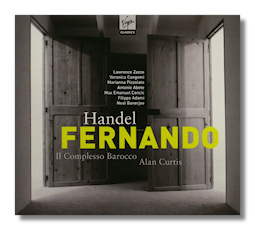
The Internet's Premier Classical Music Source
Related Links
- Handel Reviews
- Latest Reviews
- More Reviews
-
By Composer
-
Collections
DVD & Blu-ray
Books
Concert Reviews
Articles/Interviews
Software
Audio
Search Amazon
Recommended Links
Site News
 CD Review
CD Review
George Frideric Handel

Fernando
- Veronica Cangemi (Elvida), soprano
- Marianna Pizzolato (Isabella), mezzo soprano
- Max Emanuel Cencic (Sancio), countertenor
- Laurence Zazzo (Fernando), countertenor
- Filippo Adami (Dionisio), tenor
- Neal Banerjee (Alfonso) tenor
- Antonio Abete (Altomaro), bass
Il Complesso Barocco/Alan Curtis
Virgin 09463-65483-2
Handel's Fernando, Re di Castiglia (HWV 30) was first performed in February 1732 in London as Sosarme, Re di Media. But that's not the whole story. The evolution of this opera puzzles: at first Handel set it in Portugal with characters' names completely different from those we now know… only the villain, Altomaro, keeps his. Dionisio (Dinis, or Dionysius, King of Portugal) becomes Haliate, for example. Fernando King of Castile, the lover of the king's daughter, Elvira (Elvida), becomes Sosarme. Several recitatives were cut. Acts One and Two were revised; only Act Three was specifically composed under the new title, Sosarme. So what we have is a sort of first draft of something later better known in its later (and changed) form. The essence of the story, though, remained unchanged and was carried through to the new work. It's a story of misplaced love, rebellion, treachery and rivalry and strife within families. For dramatic impact, that story is what matters – not setting or names. It's possible that Handel made the changes that he did both because the other opera he staged in 1732, Ezio was too close to disaster for Handel to take risks; and because the makeup of his company changed significantly at that time. In any case, this recording is a success.
In fact, we shouldn't devote too much time wondering about the genesis and development of Fernando, nor to speculating why Curtis has presented the way he has. Probably it's because he wanted to make the reconstruction for its own sake, for completeness' sake. Regardless, the work is full of high quality music, worthy of our attention "as is". And Il Complesso Barocco under Alan Curtis have done it proud on this idiomatic and effective recording, which any Handelian can safely buy without a second thought. Although the L'Oiseau-Lyre set (transferred from LP onto Opera d'Oro OPD-1319) by Anthony Lewis (of Sosarme) is half the price and still has much to recommend it, this Virgin/EMI release must now be considered the benchmark.
Everything about the present recording is entirely consistent with the informed and authoritative approach of Il Complesso Barocco and Alan Curtis. Tempi are precise, textures neither too crowded nor too sparse. The pace and sense of structure do not lead to a flattening out of dramatic impact; nor do they wrench it in any way out of the smooth sophisticated design it is meant to be.
On the other hand, this is not an interpretation steeped in excitement, surprise or daring. The singing is clear, committed and contained. Lawrence Zazzo (Fernando) and Veronica Cangemi (Elvida) in particular make compelling listening. And Max Emanuel Cencic (Sancio) has some delightful moments. As does the despicable Altomaro, who is very convincingly sung by Antonio Abete. It has to be said that Filippo Adami (Dionisio) is a bit of a weak link, not always consistent enough or confident about the way his role has to be projected to have listeners concentrate on his character rather than his singing, however correct it may be.
In fact it's faithfulness to the libretto from which to draw the tension, ironies, let downs and antagonisms, resolved and unresolved, which make this a convincing account of a work that's not slight, yet not everyone's first choice as a Handel masterpiece.
The instrumental playing is first class… crisp, open, appealing and ideally constructed so as not only to recreate the kind of accompaniment which surely Handel must have had in mind when this rather perplexing project was begun. But also to color and carry a direct and unambiguous lesson in human (mis)conduct as appropriate for audiences in this century as those of 275 years ago. In fact, if this production and recording by Curtis and Il Complesso Barocco has one merit, it's to have penetrated to the essence of the music and rendered it not just accessible but attractive for its sense of impact and passion, without distorting the soul of the music. Recommended.
Copyright © 2008, Mark Sealey




















